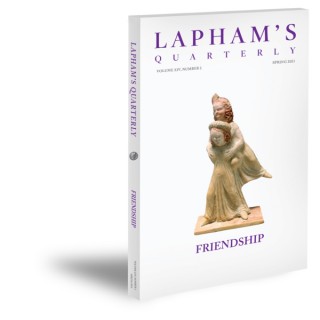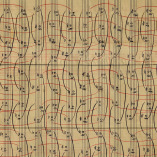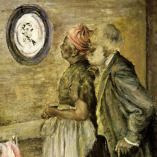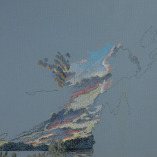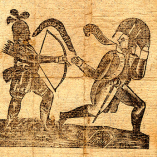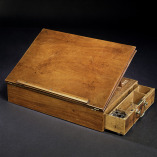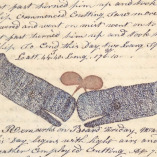
Illustration: Drawings of whales in the log of the ship Indian Chief kept by Thomas R. Bloomfield (1842–1844). Public Domain Review.
“There is no place like a bed for confidential disclosures between friends,” Ishmael tells us in “A Bosom Friend,” chapter ten of Moby Dick, excerpted in the “Friendship” issue of Lapham’s Quarterly. “Man and wife, they say, there open the very bottom of their souls to each other; and some old couples often lie and chat over old times till nearly morning. Thus, then, in our hearts’ honeymoon lay I and Queequeg—a cozy, loving pair.”
In an extended, three-part installment of our intermittent series on Moby Dick and the history of the sea, this episode of The World in Time considers the novel’s love story—the story of Queequeg and Ishmael’s friendship and marriage—as well as the novel’s dedication to Nathaniel Hawthorne. Novelist and essayist Alexander Chee joins Donovan Hohn to talk about chapter four, “The Counterpane,” in which Queequeg and Ishmael, having just met, spend the night together. Melville scholar and historian Aaron Sachs closely reads the ideological, philosophical, political, and ecological implications of chapter 72, “The Monkey-Rope,” wherein we find Ishmael and Queequeg tethered to each other by a hemp line, Ishmael aboard the Pequod, Queequeg balancing perilously atop the carcass of a slaughtered whale. Finally, novelist Caleb Crain goes swimming around in the Platonic mysteries of chapter 110, “Queequeg in His Coffin.” Both Chee and Crain propose that the entire novel, dedicated to Hawthorne, might be read as “a love letter.”
Earlier episodes in our series about Moby Dick: Episode 7 with Daniel Mendelsohn, Episode 8 with Wyatt Mason, Episode 10 with Francine Prose, Episode 12 with James Marcus, Episode 14 with Charles Baxter, and Episode 15 with Elizabeth Kolbert.
WORKS CITED
(In order of mention.)
Herman Melville. Moby-Dick: A Norton Critical Edition. Edited by Hershel Parker. New York: W.W. Norton & Company, 2017.
“Work Spouse: Ishmael meets Queequeg,” Lapham’s Quarterly, Spring 2021: Friendship.
Herman Melville. “Chapter Four: The Counterpane.” In Moby-Dick: A Norton Critical Edition. Edited by Hershel Parker. New York: W.W. Norton & Company, 2017.
Herman Melville. “Chapter 72: The Monkey-Rope.” In Moby-Dick: A Norton Critical Edition. Edited by Hershel Parker. New York: W.W. Norton & Company, 2017.
Herman Melville. “Chapter 110: Queequeg in His Coffin.” In Moby-Dick: A Norton Critical Edition. Edited by Hershel Parker. New York: W.W. Norton & Company, 2017.
Alexander Chee. Edinburgh. Boston: Mariner Books, 2016.
Alexander Chee. The Queen of the Night. Boston: Mariner Books, 2016.
Alexander Chee. How to Write an Autobiographical Novel: Essays. Boston: Mariner Books, 2018.
“Read Me Ishmael: A Moby-Dick-athon.” Dartmouth Department of English and Creative Writing, August 25-26, 2025.
“Herman Melville’s Arrowhead.” Berkshire County Historical Society.
“Hawthorne and His Mosses.” In Herman Melville: Pierre, Israel Potter, The Piazza Tales, The Confidence-Man, Billy Budd, Uncollected Prose. New York: Library of America, 1985.
Marilynne Robinson. Housekeeping. London: Picador, 2020.
Henry David Thoreau. Walden. New York: Everyman, 1995.
Alexander Chee. “Gin and Molasses.” In Loose Lips: Fanfiction Parodies of Great (and Terrible) Literature from the Smutty Stage of Shipwreck. Edited by Amy Stephenson and Casey A. Childers. New York: Grand Central Publishing, 2016.
Percival Everett. James. New York: Doubleday, 2024.
The Best American Essays 2022. Edited and introduced by Alexander Chee. New York & Boston: Mariner Books, 2022.
Lewis H. Lapham. “Episode 93: Aaron Sachs.” The World in Time from Lapham’s Quarterly, August 26, 2022.
Aaron Sachs. Up From the Depths: Herman Melville, Lewis Mumford, and Rediscovery in Dark Times. Princeton: Princeton University Press, 2024.
Donovan Hohn. “Episode 8: Herman Melville, Extracted (with Wyatt Mason).” The World in Time from Lapham’s Quarterly, July 25, 2025.
Aaron Sachs. Stay Cool: Why Dark Comedy Matters in the Fight Against Climate Change. New York: New York University Press, 2023.
Aaron Sachs. Arcadian America: The Death and Life of an Environmental Tradition. New Haven: Yale University Press, 2014.
The Cambridge History of American Literature: Volume 2, Prose Writing, 1820-1865. Edited by Sacvan Bercovitch. Cambridge: Cambridge University Press, 1995.
Lewis Mumford. Technics and Civilization. London: Routledge & Kegan Paul Ltd, 1934.
Lewis Mumford. The Culture of Cities. New York: Harcourt, Brace and Company, 1938.
Lewis Mumford. Herman Melville. New York: Harcourt, Brace and Company, 1929.
Alexander von Humboldt. Cosmos: A Sketch of a Physical Description of the Universe. Translated by E.C. Otté. New York: Harper & Brothers, 1856.
Laurence Sterne. The Life and Opinions of Tristram Shandy, Gentleman. Edited by Melvyn New and Joan New. New York: Penguin Classics, 2003.
C.L.R. James. Mariners, Renegades and Castaways: The Story of Herman Melville and the World We Live In. Waltham, MA: Brandeis University Press, 2025.
Alexander von Humboldt and Aimé Bonpland. Essay on the Geography of Plants. Translated by Sylvie Romanowski and edited by Stephen T. Jackson. Chicago: University of Chicago Press, 2013.
Scott A. Sandage. Born Losers: A History of Failure in America. Cambridge, MA: Harvard University Press, 2006.
Aaron Sachs. “Unspeakable Terrors, Unalterable Threads: Herman Melville’s cosmic cetology,” Roundtable from Lapham’s Quarterly, July 29, 2025.
“Further Reading: Aaron Sachs’ reading list for ‘Moby Dick,’” Lapham’s Quarterly Substack, August 9, 2025.
Caleb Crain. Necessary Errors. New York: Penguin Books, 2013.
Caleb Crain. Overthrow. New York: Penguin Books, 2019.
Caleb Crain. “Clay,” The New Yorker, August 4, 2024.
Caleb Crain. “The Ellipse Maker,” n+1, Spring 2023: Attachment Issue.
Caleb Crain. “Unit One,” The Paris Review, Fall 2024.
Caleb Crain. “Another Cruise: Re-Reading Moby Dick at Ahab’s age,” Roundtable from Lapham’s Quarterly, November 10, 2025.
Caleb Crain. “Lovers of Human Flesh: Homosexuality and Cannibalism in Melville’s Novels,” American Literature, March 1994. JSTOR.
Caleb Crain. “The Heart Ruled Out: Melville’s Palinode.” In American Sympathy: Men, Friendship, and Literature in the New Nation. New Haven: Yale University Press, 2001. JSTOR.
Caleb Crain. “Melville’s Secrets,” In Leviathan: A Journal of Melville Studies, October 2012. Project Muse.
James Joyce. Ulysses. New York: Vintage Books, 1990.
John Milton. Paradise Lost. Introduced and edited by John Leonard. New York: Penguin Classics, 2003.
Plato. The Symposium of Plato: The Shelley Translation. Translated by Percy Bysshe Shelley. Edited and introduced by David K. O’Connor. South Bend, IN: St. Augustine’s Press, 2002.
Herman Melville. Melville: Typee, Omoo, Mardi. New York: Library of America, 1982.
Andrew Delbanco. Melville: His World and Work. New York: Vintage Books, 2006.
Ashley Lyle and Bart Nickerson, Creators. Yellowjackets. Lionsgate Television, 2021.
Plato. The Last Days of Socrates: Euthyphro; Apology; Crito; Phaedo. Translated by Hugh Tredennick and edited by Harold Tarrant. New York: Penguin Classics, 2003.
Herman Melville. Pierre: or, The Ambiguities. Introduced by William Spengemann. New York: Penguin Books, 1996.
Herman Melville. Mardi: and A Voyage Thither. New York: Harper & Brothers, 1849.
Herman Melville. Redburn: His First Voyage. New York: Harper & Brothers, 1849.
Herman Melville. White-Jacket: or, The World in a Man-of-War. New York: Harper & Brothers, 1855.
Nathaniel Hawthorne. The Scarlet Letter. Foreword by Tom Perrotta and introduced by Robert Milder. New York: Penguin Classics, 2015.
